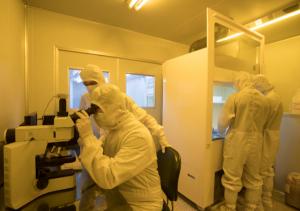Samsung Electronics is planning to establish semiconductor contract departments at three science and technology institutes outside the Seoul metropolitan area. The goal is to foster semiconductor experts in non-Seoul metropolitan areas and contribute to the nation’s balanced regional development. Samsung Electronics has signed agreements with Gwangju Institute of Science and Technology, Daegu Gyeongbuk Institute of Science and Technology, and Ulsan National Institute of Science & Technology. The semiconductor contract departments will offer five-year integrated bachelor’s and master’s degree programs focused on semiconductor process control technology. Samsung Electronics plans to select 40 students at the UNIST and 30 students each at the DGIST and the GIST in the second half of 2023.
The company will provide scholarships and allowances to students until graduation and guarantee employment at the DS division of Samsung Electronics. Samsung Electronics already runs semiconductor design and software education departments at various universities in South Korea. With these new departments, the company aims to increase the number of professional semiconductor engineers from 260 to 450 in 2029. The importance of fostering semiconductor human resources in non-Seoul metropolitan areas was also emphasized by Samsung Chairman Lee Jae-yong in a 60-trillion-won regional investment plan on March 15.
Samsung Electronics has announced that it will establish semiconductor contract departments at three science and technology institutes in South Korea, outside the Seoul metropolitan area. The plan aims to contribute to the balanced regional development of the nation and strengthen human resource ecosystems at the national level by fostering semiconductor experts in non-Seoul metropolitan areas. Samsung Electronics has signed agreements with Gwangju Institute of Science and Technology, Daegu Gyeongbuk Institute of Science and Technology, and Ulsan National Institute of Science & Technology to establish semiconductor contract departments at each institution.
The semiconductor contract departments will offer five-year integrated bachelor’s and master’s degree programs, focusing on semiconductor process control technology. The curriculum aims to meet the growing demand for process technology as competition for chip miniaturization intensifies. Samsung Electronics plans to select 40 students at the UNIST and 30 students each at the DGIST and the GIST in the second half of 2023. The semiconductor contract departments will be operational from March 2024.
Samsung Electronics runs contract departments specialized in semiconductor design and software education at KAIST, POSTECH, Yonsei University, and Sungkyunkwan University. With the establishment of these new semiconductor contract departments and an increase in the number of students at existing departments, Samsung Electronics plans to increase the number of professional semiconductor engineers from 260 to 450 in 2029.
Students of the semiconductor contract departments will be given scholarships and allowances until their graduation and provided with an opportunity to practice as interns in the field. Upon graduation, they will be guaranteed employment at the DS division of Samsung Electronics. “The semiconductor contract departments will help build a system to evenly nurture talented people in key areas of semiconductor production such as design, software, and processes,” a Samsung Electronics official explained.
In the race to foster semiconductor professionals, major rivals such as Taiwan, the United States, and China have been making significant efforts. China has been establishing semiconductor-related departments at the national level, Taiwan is easing industry-university cooperation regulations in the semiconductor domain, and the United States is encouraging international students to work in the country.
Samsung Chairman Lee Jae-yong has also recognized the importance of nurturing semiconductor human resources in non-Seoul metropolitan areas. In March, he laid out a 60-trillion-won regional investment plan and emphasized the need to grow together with local communities. “Let’s prepare for our future more boldly and actively in these difficult times,” Chairman Lee said.
Don’t miss interesting posts on Famousbio









